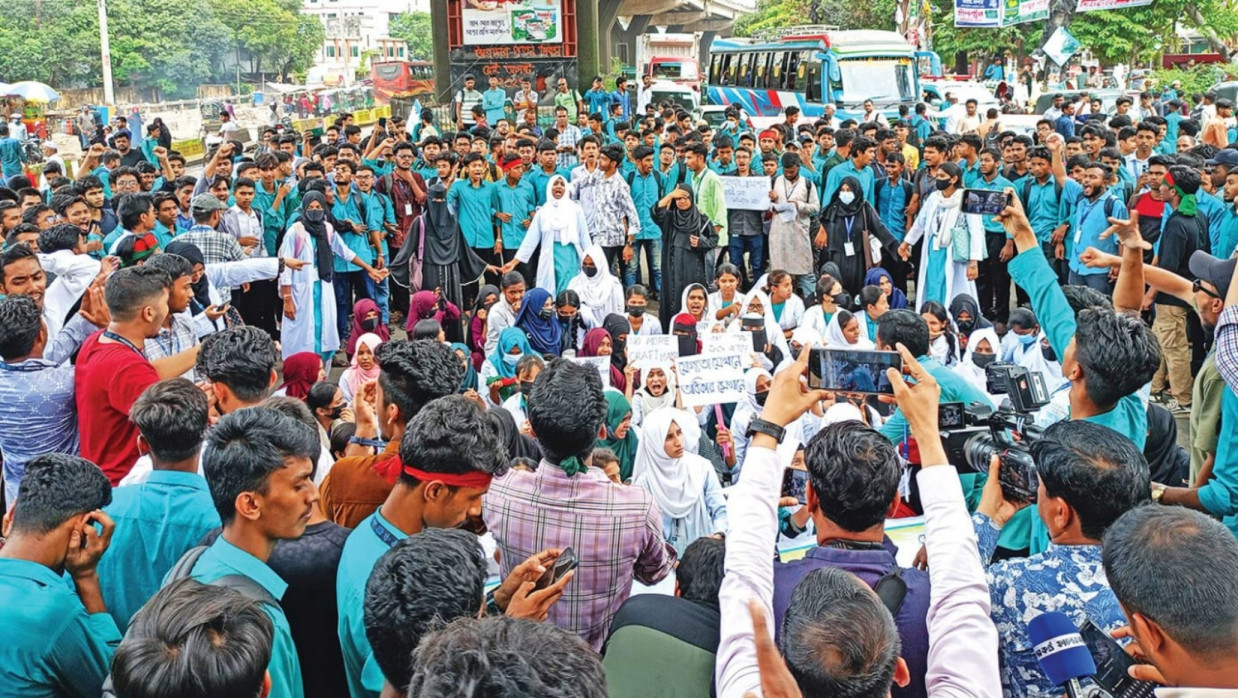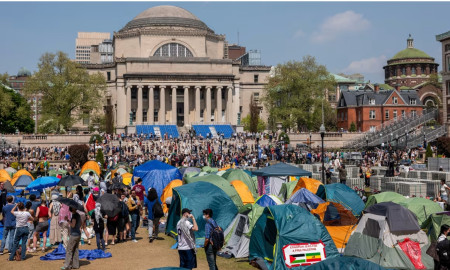Polytechnic Students’ Protests Intensify Amid Unmet Six-Point Demands

Students of polytechnic institutes across Bangladesh have been protesting for an extended period, pressing for their six-point demands. Despite resorting to road and railway blockades and even enforcing complete shutdowns of their institutions, the students have not received a meaningful response from the authorities. These actions have severely disrupted academic activities, leading to significant chaos in the academic calendar. The lack of constructive dialogue or actionable solutions from the relevant authorities has fueled growing frustration and discontent among the students, with many fearing that this could precipitate a deeper crisis in the future.
On 7 May, protesting students held a meeting with teachers, representatives from the IDB, and other stakeholders. During this discussion, they announced a temporary relaxation of the shutdown programme and, in a press conference later that day, unlocked the gates of polytechnic institutes. However, leaders of the Technical Students’ Movement Bangladesh emphasized that their agitation would continue until their six-point demands are addressed.
On 21 April, the Technical and Madrasa Education Division of the Ministry of Education invited the protesting students for talks. A decision was made to form a committee to address the implementation of the six-point demands. The following day, 22 April, the committee was officially established, with a directive to prepare a framework for implementing the demands within 21 working days.
Background of the Protests
The unrest began in 2021 following a policy change concerning the ‘Craft Instructor’ position within the technical education system. Under the then-Secretary Aminul Islam Khan, significant revisions were made to the eligibility criteria for this role. Previously, only students with SSC and HSC qualifications from the technical education stream were considered for the position. However, the new policy opened recruitment to students from the general education stream, sparking widespread discontent among technical education students.
Subsequently, Craft Instructors filed a writ petition in the High Court seeking promotions. On 16 March 2025, the court ruled in their favor, prompting immediate concerns among technical students about their future job prospects. That same day, students launched a sit-in protest at Tejgaon’s Satrasta intersection, which rapidly spread nationwide.
Since 16 March, the protests have gained momentum, with students across the country staging demonstrations, blocking roads and railways, and even holding symbolic protests, such as wearing shrouds. Torchlight processions, rallies, and sustained agitation have made the movement increasingly organized and assertive. The students issued a 48-hour ultimatum, announced a ‘Long March to Dhaka,’ and eventually enforced institutional shutdowns, compelling policymakers to take notice.
Grievances Surrounding Craft Instructors
Craft Instructors are classified as teaching positions under government gazettes, ministry orders, transfer guidelines, and training frameworks. However, unlike other technical instructors who receive promotions of up to 50-90% within a stipulated period, Craft Instructors have been denied promotional opportunities for years. In contrast, diploma holders appointed as Junior Instructors at the 10th grade can progressively advance to principal positions at the 4th grade. This disparity has been a major source of resentment, fueling the students’ protests.
In response to the agitation, the Appellate Division’s Chamber Court, presided over by Justice Md Rezaul Haque, stayed the High Court’s ruling on 20 April regarding the promotion of Craft Instructors to Junior Instructor positions. The court scheduled a hearing for 18 May before the regular Appellate Division bench. However, the students remain dissatisfied, demanding the complete annulment of the ruling and related legal proceedings.
Craft Instructors’ Concerns
Craft Instructors argue that the High Court’s ruling does not explicitly mandate a 30% promotion quota to Junior Instructor positions. Instead, it calls for promotions to higher positions within their respective fields for both technical and non-technical instructors. The ruling also directs the creation of new positions for promotions where none exist. Despite their qualifications, Craft Instructors—over 950 of whom hold BSc or diploma degrees and an equal number with degrees in physics or chemistry—have been denied promotions for the past 50 years. They pursued legal recourse to address this longstanding deprivation.
The instructors allege that polytechnic teachers and engineers have misrepresented their qualifications, misleading students into believing that their promotions would reduce job opportunities for Junior Instructor roles. They claim the protesters have resorted to a ‘mob’ approach to sway public opinion, bypassing legal processes. A similar tactic was allegedly used in 2013 to reserve 10th-grade positions exclusively for diploma holders.
Students’ Six-Point Demands
The students’ six-point demands include:
- Abolishing the 30% promotion quota for Craft Instructors to Junior Instructor positions, annulling the High Court’s ruling on their promotions, changing the Craft Instructor designation, dismissing individuals involved in the case, canceling appointments made in 2021, and amending the controversial recruitment policy.
- Revoking the provision allowing admission to Diploma in Engineering courses at any age, introducing a four-year, high-quality curriculum aligned with global standards, and gradually transitioning academic activities to English.
- Taking legal action against government, state, autonomous, and semi-autonomous institutions appointing diploma engineers to lower-grade positions, despite reservations for sub-assistant engineer roles (10th grade).
- Prohibiting the appointment of non-technical education personnel to key positions such as director, assistant director, board chairman, deputy secretary, examination controller, and principal, ensuring these roles are filled by technically educated individuals and issuing recruitment notices for vacant teaching and lab assistant positions.
- Establishing a separate Ministry of Technical and Higher Education and forming a Technical Education Reform Commission.
- Creating a high-quality technical university to enhance higher education opportunities for polytechnic and monotechnic graduates, ensuring 100% seat allocation for diploma holders in the upcoming session at the four under-construction engineering colleges (Narail, Natore, Khagrachhari, and Thakurgaon) and DUET-affiliated campuses.















